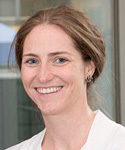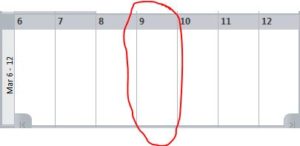July 15th, 2016
What Is Resilience?
Jamie Riches, DO
NEJM Journal Watch is happy to welcome a new panel of Chief Resident bloggers for the 2016-2017 academic year. Here’s a sample of what our new bloggers will be discussing, starting on August 1!

Jamie Riches, DO, is a 2016-17 Chief Resident in Medicine at Memorial Sloan Kettering Cancer Center.
“Resilience” is defined as the capability of a strained body to recover its size and shape after deformation caused especially by compressive stress.
On March 9, of this year, my colleagues (my friends) and I unclipped our pagers from our belts, scrub tops, and white coats to read, en masse, “Important announcement at noon conference today.”
At that noon conference, we found out that one of our fellow residents had committed suicide by jumping from the hospital housing building. This intelligent, dedicated, accomplished young physician was the third internal medicine resident in our 22 square mile city to perform this act with identical detail in just under 2 years. We were dismissed to return to our pagers.
We picked ourselves up, literally, from sobbing piles on the bathroom floor and answered our pages. The work did not stop.
 Throughout the following days and weeks, we were offered grief counseling sessions and open forums during noon conferences, where we could discuss our feelings and reactions. One morning, we were given free breakfast. We received many emails detailing these logistics, often ironically referred to as “housekeeping” items by the administration. We were desperately trying to clean up our own mess. The work did not stop.
Throughout the following days and weeks, we were offered grief counseling sessions and open forums during noon conferences, where we could discuss our feelings and reactions. One morning, we were given free breakfast. We received many emails detailing these logistics, often ironically referred to as “housekeeping” items by the administration. We were desperately trying to clean up our own mess. The work did not stop.
After more than 3 weeks of waiting for the institutional silence to be broken, we were again called to an important noon conference. We were addressed by a senior physician lecturer. He spoke about depression and suicide, and how these things can often be inevitable, unpreventable. We were reminded that we are in a high-risk profession. A stack of handouts made its way around the auditorium, offering a prescription for resilience. We were advised to train ourselves to develop a positive attitude, to face our fears and find a resilient role model. This was followed by an anecdote, highlighting the speaker’s ability to receive terribly tragic news involving one of his family members and to walk directly into a patient’s room to resume work after hanging up the phone. The lecturer proceeded to present his research on resilience, largely based on studies involving military personnel and prisoners of war suffering from post-traumatic stress disorder. Correlations were made between entering the practice of medicine and entering the battlefield.
As the lecture proceeded, I began to realize that the traumatic event to which we were referring was not only our colleague’s suicide, it was our residency training. Unfortunately, this is not a correlation with which I am unfamiliar.
The forum was then open. “Please share your thoughts, experiences… and let us know: What can we do?” What can we do?
After a long pause, one of our most highly respected senior residents spoke, expressing his frustration with the fact that we were expected to resume work minutes after being informed of this tragic and shocking event. He stated that the perception of needing anything more than to take a deep breath and simply get back to work as equivalent to weakness, in combination with the “fear of retaliation,” was likely why no one was saying anything in this forum. This was followed by a reminder from our program director that “some people were given time off, and some people are still taking time off.”
This was true. One or two people had taken time off. We were not yet aware of what the repercussions of this time off would be. One month prior to this event, our chief residents had sent email to some of the senior residents: “If you are getting this email, it is because you have sick days to pay back. Sick days need to be paid back before June 30 so the program can sign off on your 3 years of GME, so please pick up shifts when you can.” Any resident who had taken a sick day in the past year was instructed to find time to cover an extra shift in order to “pay back” the institution for allowing recovery time. I had a flashback to another mass email referencing recent lateness to an outpatient clinic shift: “These instances are deplorable… You will become that person whom people hate to work with because of your lack of professionalism. Don’t turn into that, there’s already plenty of them plaguing our health system and we certainly don’t need any more.” These words were sent from those chosen to be our advocates. A wise, seasoned (and resilient) mentor of mine once gave me this piece of advice: “The institution will never love you back.”
 Despite these examples, I don’t consider my program malignant. Malignancy in residency training refers to those programs in which the residents are placed in a hostile working environment. Despite having rapid administrative turnover (four program directors and three medicine chairs in 3 years), we have administers who are generally open to addressing resident concerns and who attempt to make changes based on resident feedback. This larger issue is not institutional; it is systemic.
Despite these examples, I don’t consider my program malignant. Malignancy in residency training refers to those programs in which the residents are placed in a hostile working environment. Despite having rapid administrative turnover (four program directors and three medicine chairs in 3 years), we have administers who are generally open to addressing resident concerns and who attempt to make changes based on resident feedback. This larger issue is not institutional; it is systemic.
I pride myself on my resilience. I am a New Yorker. I watched the Twin Towers fall on September 11, 2001, knowing that my family members were inside, saving others’ lives and sacrificing their own. I shared the grievous guilt of every family member, not only acknowledging that it could have been me, but wishing it had been. When I was choosing my own career, my father sat me down at an old wooden table at Chumley’s Bar and asked me if I thought I was “too good for the fire department.” My fear of fire is one I chose not to face. During my first year as a physician, my intern year, I received a phone call from my mother’s husband, informing me that she was in the ICU, and it “didn’t look good.” My mother’s life was plagued by a series of self-inflicted illnesses, and its culmination was that of multiple organ failure and a series of failed and futile resuscitation efforts. When I got the phone call that “it was time,” I walked into one of my patient’s rooms and informed him and his family member that I would be gone from the hospital for the afternoon because I had something to take care of. The patient’s sister replied, “I’m sure you’re very busy and have plenty of things to do, but this is his life we’re talking about.” I’ve cried every time I’ve lost a patient, someone’s mother or beloved family member, ever since. I continue to reflect on my disappointment with the overwhelmingly accepted notion that our training — the apex of our years of education, the threshold of our careers as physicians — is a traumatic event unto itself. Although, I know, in some ways, this is inevitable.
We enter medicine as if we are walking into a sacred space: hallowed halls where hierarchical gods prevail and miracles happen… until they don’t. We spent thousands of hours staring at computers and making phone calls and answering seemingly incessant pages, attempting to address questions to which we may not know the answers. We struggle to balance quality of care with quantity of care. We carry the underlying responsibility for the most vulnerable, most intimate moments of many people’s lives. This can feel like both a blessing and a burden. We not only carry people’s lives in our hands, we feel responsible for their deaths. We are tested every single day. Our knowledge, our patience, our compassion, our skill, our determination, and our stamina need to be demonstrated, examined, and verified. We struggle to find ways to work within a system that often feels punitive for its own faults. It can be lonely. It can be exhausting. It can be traumatic.
The Intern Health Study, a longitudinal study of depression among interns nationwide, estimated that “suicide rates among physicians are something like 40 to 70 percent higher in males and 130 to 300 percent higher in women.” Statistical estimates state that as many as 400 physicians commit suicide every year. Three young men and women leapt to their deaths in one city, in 16 months. We are not experiencing a tragic event; we are experiencing a harrowing trend. What can we do?
“Our needs are our greatest assets. I’ve learned to give everything I need.” – Andrew Solomon
The quote above is from a TED talk that, for months, I watched almost daily during my commute. This quote and many others gave me a great sense of comfort when I was grieving, tired, lonely, insecure, and burnt out. Looking back on those words, I wonder if the sentiment itself, or my attachment to it, is a reflection of the pathological need of the physician to feel strong.
I stood up to speak, not yet aware that my emotional state was one in which anything less than an [administrative] offer to turn back time would be received as an insult.
The resilience lecture began to feel less therapeutic [albeit well-intentioned] and more like a venue for perpetuation and exacerbation of a culture that was in itself, the compressive stress. We were being trained like soldiers, in the wake of our fallen comrade, to go out and fight! Be strong! Our strength was being measured by our ability to silently struggle through whatever we were experiencing and get the job done. Admit. Discharge. Admit again. We were being given tools to obviate the natural human state of vulnerability. We were “tasking victims with the burden of prevention.” We were reminded to be proud of our ability to charge on. I ended my commentary by stating that we were using the language of an abusive relationship.
What can we do?
- Eliminate the word “burnout” from the lexicon: Not only does burnout minimize the severity of depression, detachment and (at extremis) suicidal ideation among healthcare professionals (HCPs), it implies that those suffering post-trauma have some inherent flaw or weakness that impairs their ability to remain functional. This mindset removes the onus from the system.
- End the stigma: Remove the question, “Have you ever sought treatment for any mental illness” from the job applications. We should encourage residents, physicians at all levels, and other HCPs to actively seek out cognitive therapy as we do vaccines or PPDs.
- Decide what graduate education is: If residents are primarily learners, we must protect their time and use it solely for educational (both clinical and didactic) purposes and not to provide underpaid labor to perform all tasks for which the hospital is at a loss, no matter how menial. If residents are employees, we must provide adequate pay for educational level, protect sick leave, and outline contractual responsibilities before enrolling in the agreement.
- Stop penalizing unwellness: Physicians and HCPs are as human as our patients. We are not immune to everything. There will be times when we will be ill, physically and emotionally. We will need time and space to heal.
- Structure the system in a way that minimizes fear of retaliation: If the person creating or enforcing destructive policies is the same person who needs to write the words “excellent candidate” on the letter of recommendation that carries the weight of your future career opportunities, your best and worst interests are one and the same.
- Embrace our own fallibility: Learn to be comfortable with imperfection. Let us have an equal respect for our accomplishments and failures. Employ mentors who set this example.
- Accept that medicine is not martyrdom: The work does not stop. Let it not deplete us. Let us take care of each other and ourselves and not give away everything that we need.
“Recover” is the key word in the definition of resilience. Physicians are intimately acquainted with the process of recovery; recovery is a process. I do believe we will recover from this event, although not quite restored to our original state. We can work together to implement changes to not only create, but demand an educational and professional environment of safety, wellbeing, and, ultimately, resilience.


How can other health professions (nurses, PAs, clinical pharmacists, etc.) come in to help lift the burdens on residents? In which ways can we support you all?